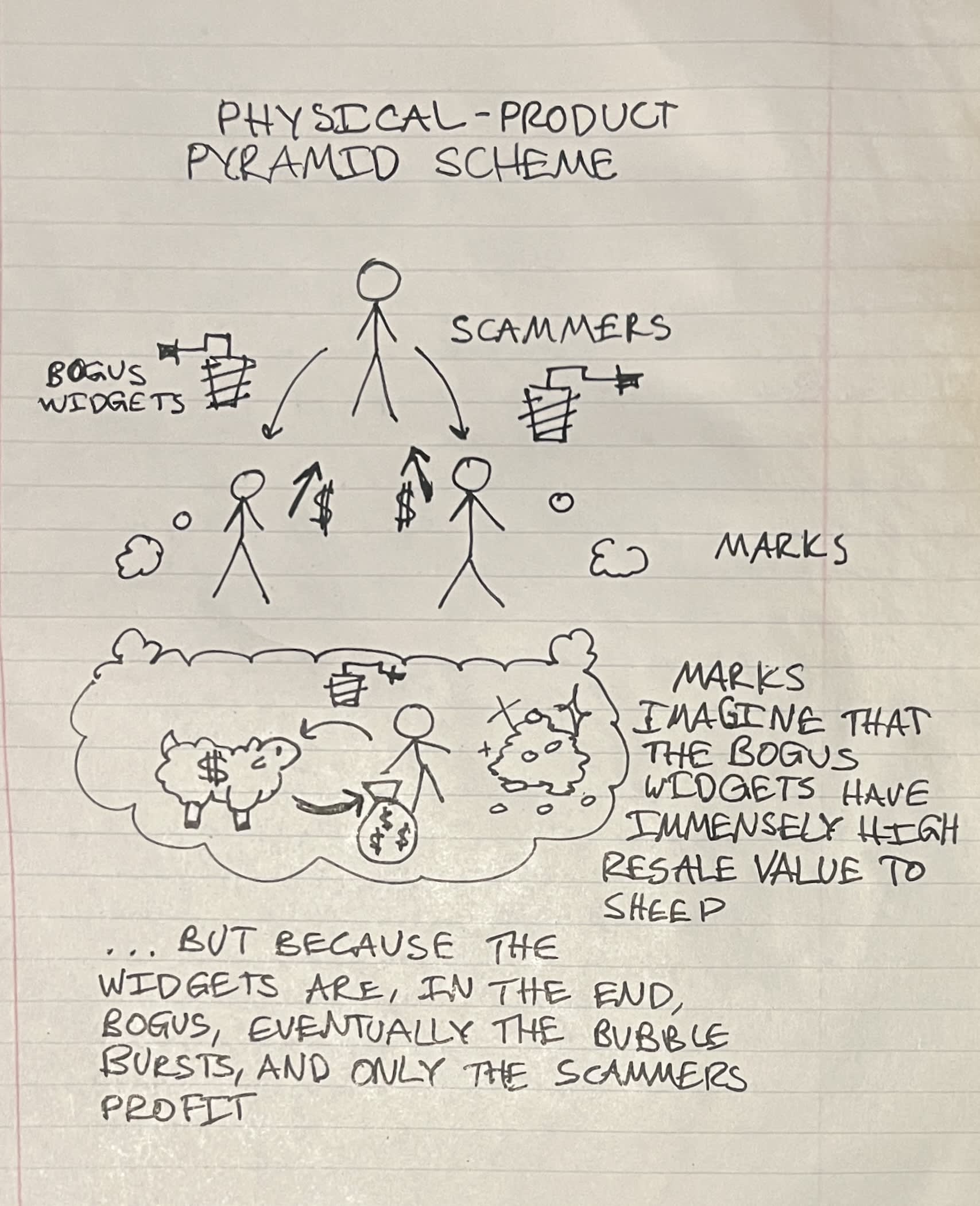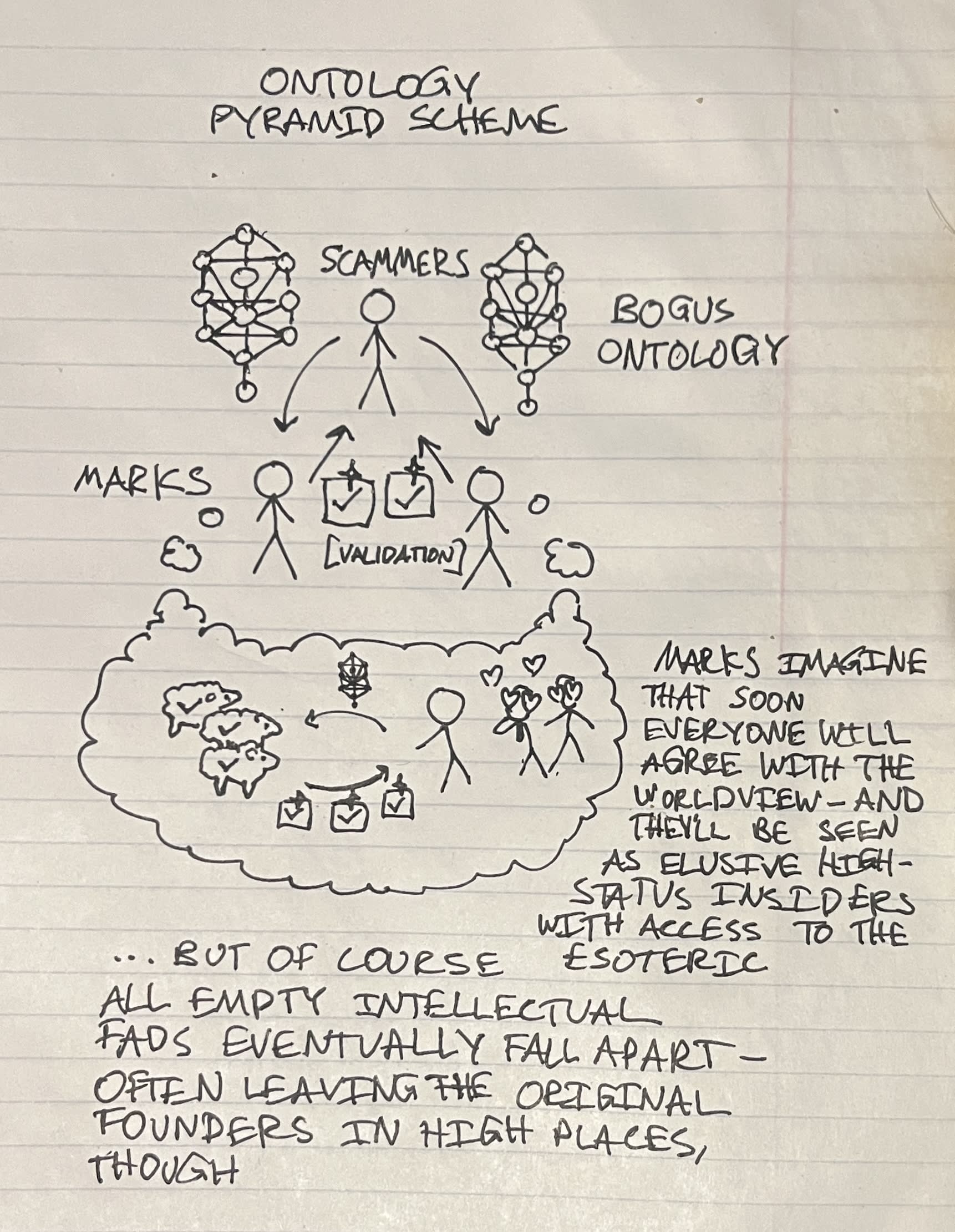Published on January 7, 2025 11:29 PM GMT
Pyramid schemes work by ambiguating between selling a product, and selling shares in the profit from the sale of that product. It's a kind of sleight of hand that saves the shills from having to explicitly say "our company is valuable because other people think it's valuable", which might otherwise be too nakedly dishonest to work. Shills can pretend they're offering marks a profitable sales job for a company that makes a product so wonderful the sheep can't resist it, marks buy in and pretend to be buying product to be used when really they're basing their high bids on the value at which they hope the product can be sold, and thus a few scammers at the top can make the value of share in their enterprise appear to inflate arbitrarily.

A similar pattern of exploitation occurs in the market for ontologies, although without legible prices or transaction.
If beliefs don't pay rent, they shouldn't be allowed to linger; the categories were made for man, not man for the categories. Just as you should decide which products to purchase based on how much value you expect to get out of using them directly, you should decide whether that big blue floppy thingy over there is a 'beast' or a 'fish' [or something else entirely] based on how you expect this to assist your ability to think about reality and draw true conclusions.
By default, when Jane Doe says "There are 4 components of personality - yellow bile, black bile, blood, and phlegm, and here's what they do" [or, alternatively, when Yamada Hanako says "there are 4 personality types corresponding to the 4 blood types, and here's what they are"], you will take her assertion and check it against your intuition, and possibly even go to the trouble of searching for concrete examples [ . . . and then counterexamples ] in your remembered experience. And then you'll decide to accept it or reject it, as a rent-paying concept structure.
Realistically, just because you run on human psychology, your decision will have a lot to do with how you feel about this particular Jane Doe. But what won't matter is how much corroborating evidence she can bring in to support her lovely categorization schema, from within a community of theorists that [unlike you] already accepts it. You know movements based on mistakes of fact build up intricate internal systems of theory all the time. Hanako can show you pages and pages of impressive-looking diagrams, but if it doesn't seem to you like there are in fact 4 types of people, all having such-and-such traits based on so-and-so blood type, you'll shrug and say "Sorry, but that all just looks like hokum to me" [because it probably is].
There exists, however, a species of ontology evangelist which attempts to use the weight and magnificence of their community's pre-existing structures of theory to cow or dazzle people into buying in, and they often succeed. This is the equivalent of a physical-goods pyramid scheme: marks who buy an ontology from such a seller tell themselves their product is very valuable, but all they've really been convinced of is that the worldview has a sky-high resale value [or the seller has the market cornered], and all their friends will be conversing in this ontology soon anyway. When the empty intellectual fad inevitably runs its course, they'll end up dumbfounded, holding nothing but a pan of fool's gold, wondering what happened. They probably won't realize what happened is they never checked the appraised value of the asset against the ground truth: its object-level use-value.
Don't fall for these scammers! It's hard not to; they're everywhere. And they're often very practiced bullies, ready with a [measuredly] forceful reminder of how, if you choose to depart from their way of talking about things, you'll have no one to see eye to eye with anyway. That, of course, is a load of bullshit in the long term, because people converge on the truth.

Having said all that, if someone has an actual argument for why I should believe in the Five Factor model of personality, I'll be much abashed [but grateful!] to hear it.
Discuss

